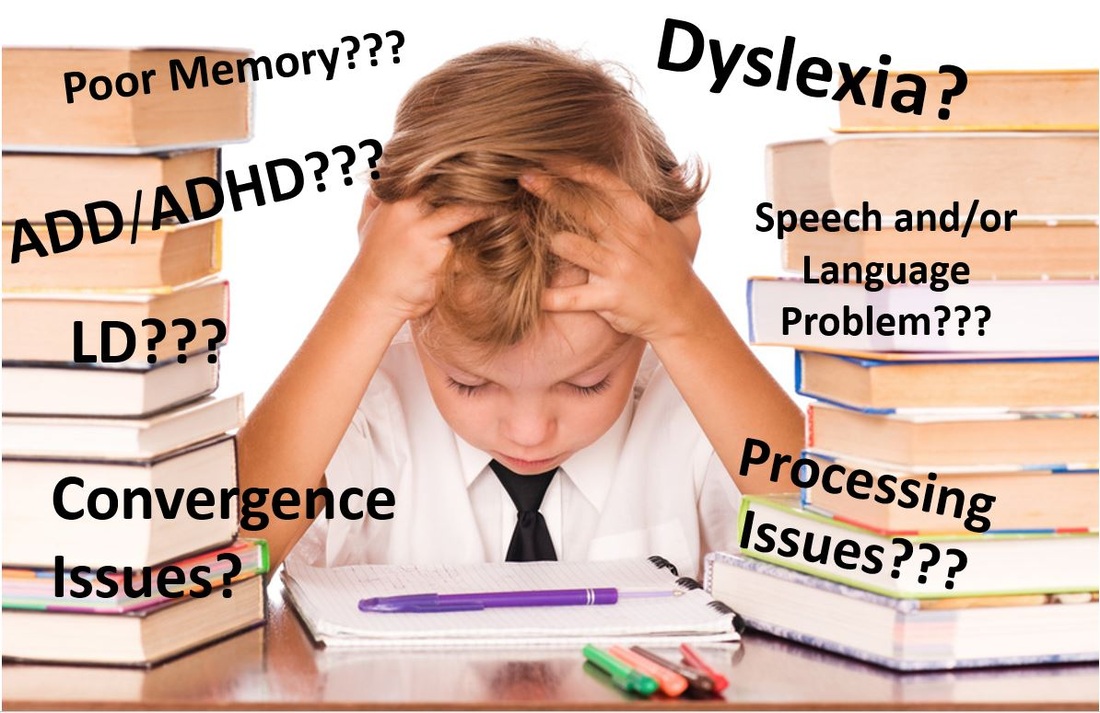Learning Disabilities
What are learning disabilities (LD)?
If your child is not doing as well in school as they have the potential to, they may have a learning disability. Having a learning disability means having a normal intelligence but a problem in one or more areas of learning.
A learning disability is a neurobiological disorder; people with LD have brains that learn differently because of differences in brain structure and/or function. If a person learns differently due to visual, hearing or physical handicaps, mental retardation, emotional disturbance, or environmental, cultural or economic disadvantage, we do not call it a learning disability.
Some people with LD also have attention deficit hyperactivity disorder or ADHD.
LDs can affect many different areas:
- Spoken language—problems in listening and speaking
- Reading—difficulties decoding or recognizing words or understanding them
- Written language—problems with writing, spelling, organizing ideas
- Math—trouble doing arithmetic or understanding basic concepts
- Reasoning—problems organizing and putting together thoughts
- Memory—problems remembering facts and instructions
- Social behavior—difficulties with social judgment, tolerating frustration and making friends
- Physical coordination—problems with handwriting, manipulating small objects, running and jumping
- Organization—trouble with managing time and belongings, carrying out a plan
- Metacognition (thinking about thinking)—problems with knowing, using and monitoring the use of thinking and learning strategies, and learning from mistakes
Why is early diagnosis and treatment so important?
When LDs are not found and treated early on, they tend to snowball. As kids get more and more behind in school, they may become more and more frustrated, feeling like a failure. Often, self-esteem problems lead to bad behavior and other problems. High school dropout rates are much higher for students with LDs than for those without [1]. These educational differences, in turn, affect the job and earnings prospects for people with LDs. When LD is not noticed or not treated, it can cause adult literacy problems. By identifying LDs early, your child will get the help they need to reach their potential.
- Get more facts about how LDs affect literacy, education, jobs and earnings from the National Institute for Literacy.
How common are learning disabilities?
Educators estimate that between 5 and 10 percent of kids between ages 6 and 17 have learning disabilities [2]. More than half of the kids receiving special education in the United States have LDs[3]. Dyslexia is the most common LD; 80 percent of students with LDs have dyslexia [4].
What causes learning disabilities?
Because there are lots of kinds of learning disabilities, it is hard to diagnose them and pinpoint the causes. LDs seem to be caused by the brain, but the exact causes are not known. Some risk factorsare:
- Heredity
- Low birth weight, prematurity, birth trauma or distress
- Stress before or after birth
- Treatment for cancer or leukemia
- Central nervous system infections
- Severe head injuries
- Chronic medical illnesses, like diabetes or asthma
- Poor nutrition
LDs are not caused by environmental factors, like cultural differences, or bad teaching.
When your child is diagnosed with a LD, the most important thing is not to look back and try to figure out if something went wrong. Instead, think about moving forward and finding help.
How can I tell if my child might have a learning disability?
Know the warning signs to look for in preschool through teenaged kids. Some LDs emerge before kids even start school, while others go undetected until as late as middle or high school.
What should I do if I suspect my child is having trouble learning?
If you think your child may have an LD, do not delay in getting help for your child. Trust your instincts—you know your child better than anyone else. Lose your fear—once you figure out how your child learns differently, you will be able to help them learn better. The sooner you get started, the more of your child’s potential may be reached. The first step is to talk to your child’s doctor and ask for a referral, or to contact your local school system. Sometimes a sight or hearing problem, family stress, worry, or communication problems can affect a child’s ability to learn well.
- If your child is having trouble in school or doesn’t seem to be on track, a good starting place is LD Basics, which covers the common learning disabilities, common signs, how to respond, getting help early, and parent tips.
- Getting started at home—ten things parents can do to help their children with LDs.
- Advocating for your preschool child.
- Advocating for your school-aged child.
What can the school system do for my child if I suspect an LD?
You can ask your school system in writing for an evaluation of your child. They are required to provide it, at no cost to you. The purpose of an evaluation is to find out why your child is not meeting theirdevelopmental milestones or not doing well in school. A team of professionals will work with you to evaluate your child. If they do not find a problem, you can ask the school system to pay for an Independent Educational Evaluation (IEE). There are strict rules about this, so you may not get it. You can also have your child tested again privately, and pay for it yourself. But check with your school district first to make sure they will accept the private test results. By law, the school system must consider the results of the second evaluation when deciding if your child can get special services.
- Finding Help for Young Children with Disabilities is a parent guide that explains how to access help and early intervention (see below) for children ages zero to five. It’s also available in Spanish: Programas para Infantes y Niños Pre-escolares con Discapacidades.
- Basics for Parents: Your Child’s Evaluation explains what parents of school-aged kids need to know about the evaluation process. It’s also available in Spanish: La Evaluación de Su Niño
If testing shows your child has a learning disability, the school system will start your child in either anearly intervention or a special education program, depending on your child’s age.
What is early intervention?
Early intervention is designed to identify and treat a learning disability or developmental delay in an infant, toddler, or preschooler as early as possible. The services are offered through public or private agencies and are provided in different settings, like the child’s home, a clinic, a daycare center, a hospital, or the local health department. Early intervention services can range from prescribing glasses for a two-year-old to developing a complete physical therapy program for an infant with cerebral palsy. It often involves physical, occupational, and/or speech therapy. Even young babies may benefit from early intervention. Today, we have many ways that didn’t exist just a few years ago to help babies and toddlers. We have a better understanding of the treatment of many problems. Doctors and nurses, hearing and speech therapists, nutritionists, and physical therapists are constantly developing more effective treatment programs. If you live in Michigan, your doctor may refer you to the Early On Program in your local school district. (Outside Michigan, you can find your state’s early intervention services through the NICHCY website.) Early On (and all states’ early intervention programs) offer many different services and will help set up an individualized program for your family. It is called anIndividual Family Service Plan (IFSB).
What is special education?
Special education means “educational programming designed specifically for the individual.” It can really help your child do better in school. If your school-aged child qualifies for special education, they will have an Individualized Education Program (IEP) designed just for them.
- Here is a helpful overview of the special education process.
- Find out all about the process on this comprehensive page from the US Office of Special Education and Rehabilitative Services. You can also download the information in Word or a 40-page PDF format.
- Find out how to help create a useful IEP for your child.
- Empower yourself to be a great advocate for your child at IEP meetings. Use this Pop-Up IEPfrom Hands and Voices, (a support group for families of children who are deaf or hard of hearing) to find out some of the common hurdles that may come up during the meeting and how to deal with them. Some of the pop-ups apply more to kids with deafness/hard-of-hearing, but most will be helpful.
- Help your child take part in making their own IEP, with this Student Guide set of materials from NICHCY. Developed especially for older students with disabilities, these award-winning guides include a booklet for students, another for families and professionals, and an audiotape for everybody!
What is transition planning for high school students?
Transition planning means planning to get your child ready to lead a rewarding life as an adult. As your child gets closer to adulthood, they may have an IEP transition plan. Transition planning begins at age 14. It is part of the IEP every year after that. At age 16, planning will begin for how your child will transition from school into the community. The goal is for your child to become as independent as possible. Your child should take part in the planning, because their input will help make the plan more successful. For a thorough discussion (28 pages when printed) of the transition plan, see Transition Planning: A Team Effort, from NICHCY. You should also check out this information on Learning Disability: Life after High School. Find out more from these resources about the transition from school to school, college or work. Get ideas on how to decide between college or training programs.
What are some tips and resources for college-bound high school students and young adults with LD?
These pages offer advice and resources:
- Tips for College Bound High School Students with Diagnosed Learning Problems
- Selecting A College for Students with Learning Disabilities or Attention Deficit Hyperactivity Disorder (ADHD)
- College Students with Learning Disabilities Speak Out: What It Takes to Be Successful in Postsecondary Education
- College Opportunities for Students with Learning Disabilities
- It’s Your Career: Work-Based Learning Opportunities for College Students with Dsabilities
- The HEATH Resource Center is the national clearinghouse on postsecondary education for individuals with disabilities
- Creating Options: 2007 Financial Aid for Individuals with Disabilities
- Scholarships for students with learning disabilities
What do I need to know about special education laws? What are our rights?
- Here is a useful glossary of special education (legal) terms and a glossary of special education acronyms to help you make sense of things.
- Find out your rights, as a parent, in the special education process.
- Questions and Answers about IDEA (the Individuals with Disabilities Education Act).
- Additional resources about IDEA, from NICHCY.
- What do the laws say?
- Internet legal resources about special education and disabilities
What are some parenting tips for parents of kids with LD?
- Learn as much as you can about your child’s LD.
- Figure out how your child learns best. What are their special skills, talents, and interests? This information can help you motivate and foster your child’s learning. Be open to other ways of learning. The senses, movement, and listening are all ways of gathering information. What works best for your child?
- Encourage your child to work on their special talent. When they can really shine in some area, it helps them feel like a success.
- Give your child unconditional love and support.
- Accept your own mistakes. Model for your child that mistakes do not equal failure! Show your child that mistakes can be useful and lead to solutions.
- Help your child understand their learning problems and talk about them. Focus on coping skills.
- Help your child stay strong in body and mind by providing good food, enough rest, play, and family outings.
- If you’re having trouble coping, get professional counseling. It can be tough handling difficult behavior from your child and difficult feelings of your own.
- Join a support group for parents of kids with LDs. A support group can help you feel less alone, get information, and learn strategies from other parents. You will find a number of resources for finding support at the end of this page.
How can I help my child with school?
- Get involved in your child’s education.
- Stay in close touch with your child’s school.
- Ask teachers how you can help provide consistency and how you can reinforce and expand on what’s going on in the classroom.
- Talk with your child’s teacher about both academics and behavior.
- Discuss homework strategies with your child’s teacher.
- Learn how to be an efficient homework helper at home.
- Provide an organized home with time and a place for study.
- Help your child get organized.
- Make sure your teen learns good study skills.
- Don’t let struggling with your child over homework pit you against your child.
- Try to keep your involvement positive by helping create your child’s IEP, and by sharing your insights about your child with their school.
Where else can I find information and support?
Learn more about learning disabilities:
- Misunderstood Minds is a companion site to the PBS special on learning differences and disabilities. You can explore stories from the show and find information and resources for parents.
Specific populations:
- Spanish information: LD Online En español
- The National Association for the Education of African American Children with Learning Disabilities seeks to improve the quality of education for African American children. Their website offers many kinds of support for parents.
Specific learning disabilities:
- Dyslexia and Reading Problems
- Speech and Language Delay and Disorders
- Non-verbal Learning Disorders
- Discalculia: learning disabilities in mathematics
- Dysgraphia: writing disability
- Dyspraxia: learning disabilities and motor skills
- Gerstmann’s syndrome
- Information processing disorders
Related topics on YourChild:
- ADHD (Attention Deficit Hyperactivity Disorder)
- Developmental Milestones
- Developmental Delay
- Siblings of Kids with Special Needs
- Getting Involved in Your Child’s Education
- Reading and Your Child
Books:
- Learning Disability: Resource List lists books for kids of all ages and adults about dyslexia and other learning disabilities.
Organizations:
- NICHCY (National Information Center for Children and Youth with Disabilities) publishes free, fact-filled newsletters, arranges workshops and speakers, and advises parents on the laws entitling children with disabilities to special education and other
- Early On Michigan is the state of Michigan’s early intervention service. If you live outside Michigan, NICHCY can help you find your own state’s early intervention service.
- Zero to Three has information for parents on their kids’ development and learning in the first 3 years of life.
- The Learning Disabilities Association seeks to enhance quality of life for people with LD through advocacy, education, research and service. They also publish news briefs and a professional journal and provide information and referral to state chapters, parent resources and local support groups.
- LD Online provides a wealth of information for parents, teachers and kids, as well as bulletin boards, and more. They also have LD information in Spanish.
- The National Center for Learning Disabilities works to ensure that children, adolescents and adults with learning disabilities have every opportunity to succeed in school, work and life.
- The International Dyslexia Association (IDA) offers an international network that brings professionals in the field of dyslexia and parents together for a common purpose.
- Great Schools provides content from Schwab Learning, including E-ssential Guides, which focus on a specific topic and include suggested resources.
- The Council for Learning Disabilities is an international organization for professionals.
- The American Speech-Language-Hearing Association has a Web page with some information on LD-related topics. They can also provide a referral to a speech and language pathologist.
- LD Online has a Kids section, where kids can find good books about LDs, and see other kids’ stories and artwork.
- The Division for Learning Disabilities is a special interest group of the Council for Exceptional Children, a professional organization that provides publications for educators, and can also provide referral to ERIC (Educational Resource Information Center Clearinghouse on disabilities and gifted education).
- NAPSEC (National Association of Private Special Education Centers) provides referrals for private special education programs.
- Sibling Information Network publishes a newsletter for and about siblings of children with special needs.
- ADD Warehouse is a catalog of books, videos, and other products to help parents, educators and health professionals understand and treat all developmental disorders, including LD and related problems.
Written and compiled by Kyla Boyse, RN. Reviewed by faculty at UMHS.
Updated November 2012







Leave A Comment